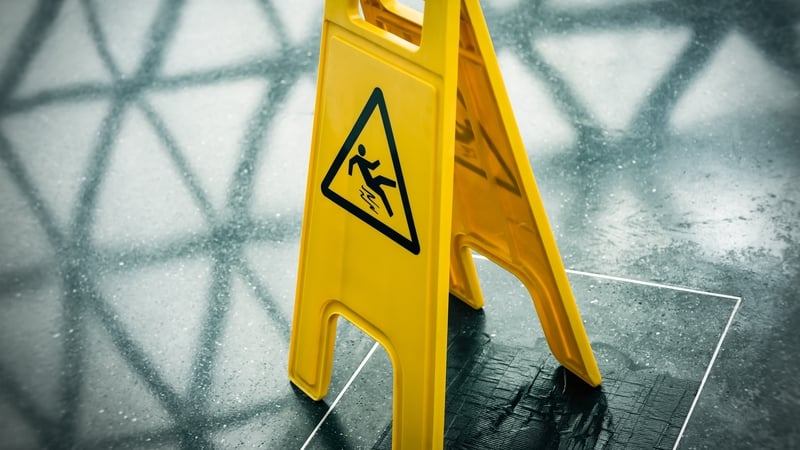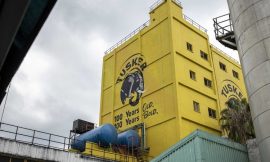A manager at a workwear and safety supplier dismissed after complaining about taking a fall on a damaged floor in its warehouse has won €10,000 for health and safety-related penalisation.
Louise O’Connor secured the award against her former employer, Smyth Kinsella Limited, trading as Kustom Workwear Uniform and Safety Specialists, on foot of a Workplace Relations Commission ruling that the accident was an “operative reason” for her dismissal.
The firm had insisted it ended Ms O’Connor employment during probation in May 2024 due to “inadequate performance and poor attitude” – factors the worker said were never discussed with her.
The WRC found the Waterford company in breach of the Safety, Health & Welfare at Work Act, 2005 in a decision published today.
Ms O’Connor joined the firm in February 2024 as a retail manager whose duties were to attend to customers at a shop and to fill online orders from the company’s warehouse. She had 28 years’ experience in a similar industry when she joined, the tribunal heard.
Her barrister, Joseph Bradley BL, stated in a legal submission that the floor in the warehouse had several holes as a result of untreated water leaks from the roof.
“Due to the poor state of the floor, the complainant tripped and fell. The complainant and a colleague undertook filling the hole, covering same with tape and putting a sign nearby to alert others as to the risk,” Mr Bradley submitted.
Ms O’Connor reported the fall in April 2024 to the firm’s warehouse manager and made a note of it in an official accident log, the tribunal was told.
Mr Bradley submitted that when his client discussed the fall with the CEO at a meeting in mid-April, she highlighted the “dangers of the unsafe flooring including her own fall”.
Despite that, the CEO told her the floor would “cost thousands to fix”, Mr Bradley added.
“Despite this meeting, the respondent failed, neglected or refused to rectify the unsafe work environment and the complainant and her colleagues were forced to stuff and tape the most severe holes in the floor for fear of further falls. Most of the other holes were not addressed at all,” Mr Bradley told the WRC.
Ms O’Connor reported another fall in the warehouse early in May 2024 when she tripped over the forks of a forklift that had been “left sitting in the middle of the warehouse”, the WRC heard.
Ms O’Connor’s position was that her fall was witnessed by two members of staff, including a warehouse manager she believed went to report her second accident.
She was called to a meeting and dismissed on 16 May 2024, the tribunal was told. Her evidence was that she was “dismissed without being given proper reason” and said that her performance was never discussed with her.
She said she was “convinced” that the reason for her dismissal was the two falls in the workplace.
Adjudicator Gaye Cunningham recorded that sworn evidence was given by four company witnesses, including its managing director, warehouse manager, safety officer and office manager, but did not record their names in her decision.
The managing director’s evidence was that he gave Ms O’Connor a verbal warning on 16 April 2024 for “unauthorised breaks and use of [a] mobile phone”.
He denied any link between the dismissal and the first workplace accident, and said he had no knowledge of the second incident referred to by the complainant’s lawyers until the firm received a solicitor’s letter.
The safety officer’s evidence was that Ms O’Connor failed to log either of the two incidents, while the company’s office manager gave evidence of “shortfalls in performance” on the part of the complainant.
In her decision, Ms Cunningham wrote there was an “irreconcilable” conflict of evidence about the mid-April meeting, since there was no note of it. However, she concluded that the evidence before her at hearing “was that an incident with the forklift and a tripping issue did occur”.
She wrote that there was “more than one causal factor” that led to Ms O’Connor’s dismissal, noting the employer’s position in relation to her performance on the job.
However, her view was that there was a lack of procedural fairness and a “predisposition” on the part of the company to terminate Ms O’Connor’s employment.
“I find that the complainant’s accident on 8th April 2024, and the recording of same was an operative reason for the dismissal of the employee and that the complaint of penalisation has been made out,” Ms Cunningham wrote.
Upholding the complaint, she awarded Ms O’Connor €10,025 in compensation.




